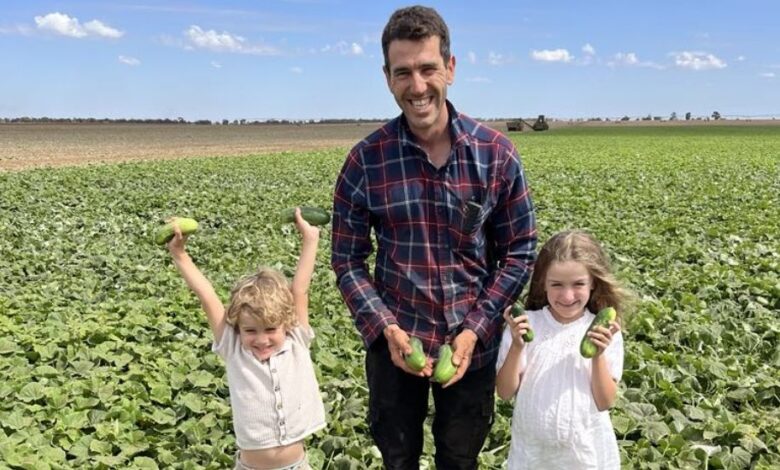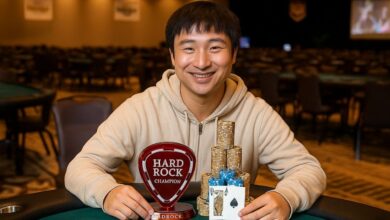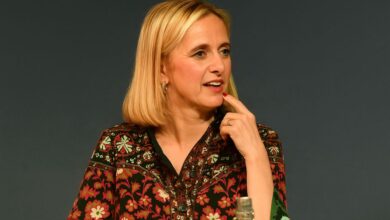Tony Parle: The Australian Farmer Behind McDonald’s Pickles”

When people enjoy a burger from a global fast-food giant, few think about where the ingredients come from. Yet, behind one of the smallest but most distinctive burger components — the humble pickle — stands an Australian farmer whose story captures resilience, innovation, and persistence. Tony Parle, a name less known to the public, is one of Australia’s key suppliers of pickles to McDonald’s. His decades-long journey from a local farmer in Griffith, New South Wales, to a vital part of a global food chain reflects not only his entrepreneurial spirit but also the evolving story of modern agriculture in Australia.
This article delves deep into who Tony Parle is, his career beginnings, the rise and challenges of his agribusiness, and how he turned gherkin farming into a national success story that continues to feed millions every year.
Who Is Tony Parle?
Tony Parle is an Australian farmer and agribusiness operator based near Griffith, in the Riverina region of New South Wales. Known across agricultural circles as the “Pickle King,” Parle and his family have supplied McDonald’s Australia with pickled cucumbers — the tangy burger essential — for more than three decades.
Tony Parle represents a rare combination of hands-on farming experience and business acumen, running a vertically integrated enterprise that oversees everything from planting cucumbers to fermenting, slicing, and packaging them for delivery.
Despite the commercial scale, Parle’s operation remains a family-run business, a key part of its identity and success. The farm’s commitment to reliability, sustainability, and quality has ensured its place in Australia’s food-processing industry.
Early Life and Entry Into Farming
Tony Parle’s roots are deeply tied to Australian soil — literally. Born and raised in the Griffith area, his life revolved around farming from a young age. The region, known for its fertile land and irrigation systems, has been a backbone for Australia’s fruit and vegetable industry.
In the late 1980s, when the opportunity to grow and process cucumbers for McDonald’s arose, Parle’s family took a calculated leap. It wasn’t an easy decision; cucumber farming — especially gherkin varieties used for pickles — demands precision and quick response times. Within 48 hours, an overgrown gherkin can become unfit for pickling.
Tony Parle, with his keen eye for opportunity and determination, spearheaded this new venture. Over time, his family’s operation developed into one of the most consistent suppliers in the country.
The Birth of a Pickle Empire
The Parle farm began as a modest operation focusing on traditional crops, but the contract with McDonald’s changed everything. Over the years, the family refined every step of the production process — from selecting seed varieties and timing irrigation to controlling the fermentation process.
Today, the Parle enterprise produces an estimated 1,800 tonnes of pickles annually, translating to nearly 20 million pickles that find their way into McDonald’s burgers across Australia each year. This consistency is no small feat in a country often affected by droughts, water restrictions, and unpredictable weather patterns.
Tony Parle once remarked that their success was built on a simple philosophy: “We’ve never missed a supply.” That dedication to reliability has been the foundation of the Parle brand’s reputation.
How the Pickles Are Made
While consumers might view pickles as a simple condiment, Tony Parle’s process reveals a sophisticated agricultural and industrial operation. The journey of a pickle begins in the paddock — with small, firm cucumbers bred specifically for pickling.
The cucumbers are harvested by hand or machine when they reach the exact right size — neither too small nor too large — to ensure the right crunch and texture. Once harvested, they are placed in brine for four to six weeks, during which fermentation naturally occurs.
After fermentation, the cucumbers are sliced, processed, and packed according to McDonald’s strict quality requirements. Each step demands precision, temperature control, and hygiene standards equivalent to large-scale food-processing facilities. The result is a product that remains consistent in taste, texture, and safety across millions of burgers served nationwide.
Challenges on the Road to Success
Tony Parle’s business story is far from a smooth ride. Like many farmers, he faced droughts, crop failures, and financial hardships that tested the very foundation of his operations.
At one point, Parle’s ambition led him to diversify the business into frozen vegetables, including corn and beans, expanding the company beyond its core pickle production. However, this rapid expansion proved too risky. Market fluctuations, high operational costs, and water shortages caused the business to fall into financial distress, leading to receivership and liquidation.
Yet, this setback became a turning point. Tony Parle rebuilt his operations, this time with a more focused approach — concentrating solely on his area of expertise: gherkin and pickle production. His ability to recover from financial turmoil while maintaining major supply contracts demonstrates both resilience and strong business leadership.
Lessons from the Struggles
Tony Parle’s experience is a valuable lesson in agricultural entrepreneurship. Over-expansion and deviation from core strengths can quickly destabilize even successful enterprises. The Parle family’s decision to return to what they did best — producing pickles — was a critical move that preserved their legacy and livelihood.
Moreover, Parle’s story illustrates the importance of adaptation and learning. His openness about mistakes, coupled with his determination to continue, has inspired many within Australia’s agricultural community.
In interviews, he has stated that life in farming is unpredictable, and the key to survival is persistence. As he famously said, “Life is an experience… it’s a package deal. You don’t get to choose which part you keep and don’t keep. You just got to live with it and go forward.”
Partnership with McDonald’s
Perhaps the most fascinating aspect of Tony Parle’s journey is his enduring relationship with McDonald’s — one of the world’s most recognized brands. The partnership began in the early years of the Parle farm’s pickle production and has continued for decades.
To maintain this relationship, Parle’s business must meet strict global standards on quality, supply chain management, and food safety. Each batch of pickles undergoes rigorous testing before it reaches McDonald’s distribution centers.
The reliability and trust built between Parle’s enterprise and McDonald’s are rare in the agricultural world. It’s a testament to how small-scale producers, through consistency and commitment, can become vital suppliers in global systems.
The Science and Timing Behind Gherkin Farming
Growing gherkins is a science of timing and precision. Tony Parle often explains that cucumbers grow at a “ruthless pace.” A delay of just 48 hours can double their size, rendering them useless for pickling. This means the farm operates with strict schedules, ensuring that harvesting and processing occur at the perfect moment.
The process demands a well-trained workforce and meticulous management. From irrigation to transportation to fermentation, each step must align seamlessly. Parle’s operational excellence has turned what was once seen as a small-scale niche into a dependable industrial system.
Sustainability and Local Impact
The Parle family has also focused on sustainability and regional employment. By sourcing locally, investing in machinery, and maintaining in-house processing facilities, they provide jobs and economic support to the Griffith community.
Their efforts help sustain Australia’s local food manufacturing, which has faced increasing pressure from imports. Tony Parle’s philosophy emphasizes producing locally, supplying globally, showing how regional producers can thrive in competitive markets.
Public Recognition and Media Coverage
Over the years, Tony Parle has been featured in several Australian news outlets, including ABC News and News.com.au. Media coverage often paints him as an emblem of perseverance and ingenuity.
In one popular feature, he was described as the “farmer who keeps McDonald’s in pickles,” highlighting the unique intersection between small-scale farming and global commerce. His story resonates with readers because it humanizes industrial food production, revealing the dedication required to keep even a single product consistent over decades.
Family and the Human Side
Despite his achievements, Tony Parle remains grounded. The Parle enterprise continues to be run as a family business, involving close relatives who share responsibilities across operations.
This family-based management style not only fosters accountability but also maintains traditional values of hard work, loyalty, and perseverance. Even with modern technology and large-scale operations, Tony emphasizes the importance of staying connected to the soil and the people who work it.
Resilience Through Change
Tony Parle’s long career mirrors the evolution of Australian agriculture — from small independent farms to integrated agribusinesses capable of supplying global markets. Through droughts, economic downturns, and shifting consumer trends, his ability to adapt has been his greatest strength.
He represents a generation of farmers who bridge the gap between tradition and technology, proving that innovation doesn’t always mean abandoning heritage. For Tony, progress lies in improving processes while preserving principles.
Tony Parle’s Legacy
After decades in the business, Tony Parle’s contribution goes beyond the pickles themselves. His journey embodies the essence of Australian rural entrepreneurship — resilient, humble, and deeply connected to the land.
He has become a case study for business schools and agricultural networks interested in understanding how small family operations can thrive under global partnerships. His story also inspires young farmers to pursue agribusiness not just as a livelihood but as a sustainable, scalable profession.
For Tony, success is measured not only in tonnes of produce but in continuity and community — ensuring his farm continues to operate, employ locals, and contribute to the national food chain for years to come.
Conclusion
Tony Parle’s story is more than just about farming; it’s about endurance, adaptability, and purpose. From overcoming financial setbacks to maintaining one of the longest-running supply partnerships with McDonald’s, his career showcases what’s possible when vision meets dedication.
He stands as a symbol of Australia’s agricultural strength — someone who turned gherkins into gold through hard work and innovation.
As the Parle family continues to manage their thriving pickle business, their story remains an inspiring example of rural entrepreneurship and global connection — a tale that proves greatness can grow from even the smallest seeds.
— Written and compiled for Buzz Vista



